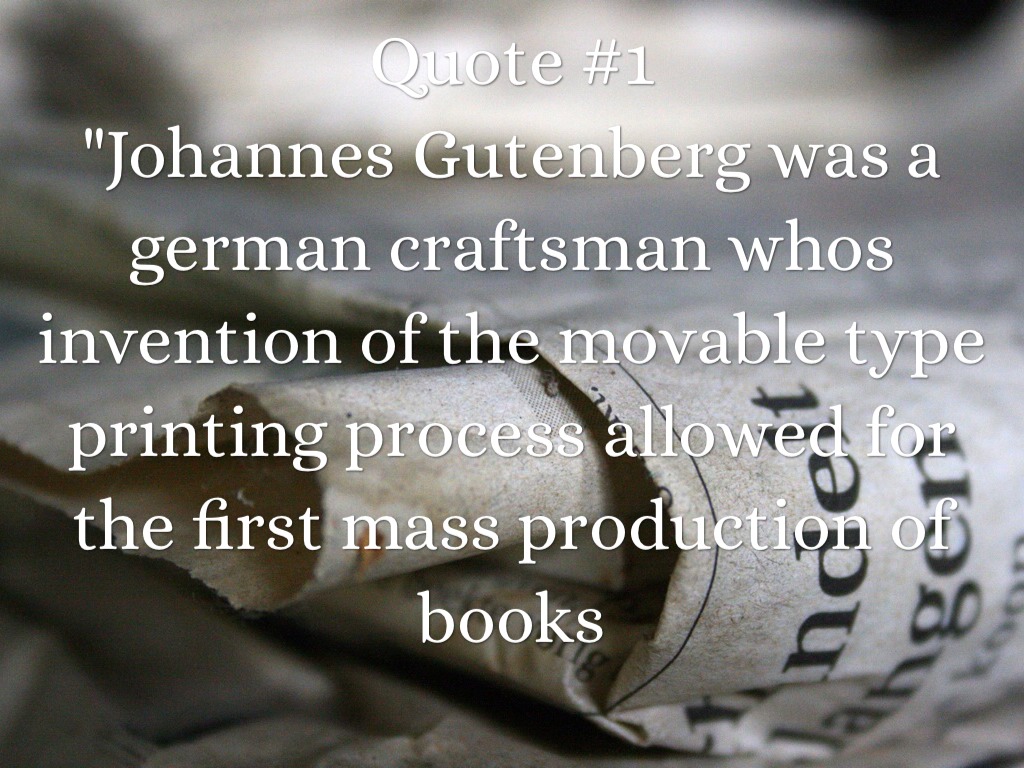
The printing press altered the nature of the way we think, speak, and behave. Paul Silverzweig from Tiverton RI USA on August 14, 2014: I think that the invention of the printing press is probably the historical keystone upon which future democracy, education, science and so on were all built. However, your point is astute and correct, and I have changed the wording of this article slightly to reflect that.ĭemocracy was concieved around 500 BCE by the ancient Greeks, so your claim that "It is possible that without it there would have been no Renaissance, no Industrial Revolution, no Technological Revolution and no Democracy." is partially false.Īmanda Littlejohn (author) on August 15, 2014: I had in mind modern, western democracy, whose process relies on the wide dissemination of information among a broad population, not just an elite class (remember that slaves and women couldn't vote in the relatively tiny "democracies" of a few hundred to a few thousand people). Indeed, "demos" signifies both "village/town/city" and "people" in the sense of the people who live there.īack then, the democratic structure and process was very different than that which we enjoy in the modern west. You're right, of course, that the early city state democracies originated in ancient Greece.

Thank you so much for this! I'm writing a paper on the press and Gutenberg and this was extremely helpful!Īmanda Littlejohn (author) on September 04, 2017: Hey thank you so much, this helped me a lot and it's amazing.Īmanda Littlejohn (author) on October 27, 2017: I'm glad you found it helpful and interesting learning about the "Wild West" and cowboys - and cowgirls! Write about this stuff!!Īmanda Littlejohn (author) on December 07, 2017: Gutenberg may have developed his version of the printing press independently or-more likely-he had some clue of what the Chinese and Koreans had done. Jikji, you know, was printed in Cheongju, Korea in 1377. Gutenberg has been praised much too highly. Most scholars now agree that the printing press came from the Far East. They were using movable porcelain type and movable metal type, and that is an early form of the printing press. Well, you need to acknowledge what the Chinese and Koreans did long before Johnny G. Thank you once again for a great contribution! However, I'm glad you've redressed the balance.Īnd for any reader who may be interested, a Google search for "Jikji printed in Cheongju, Korea in 1377" turns up fascinating results about the famous Buddhist text and the technology used to print it. Please reply me back and tell me if I misunderstood your article or your contents. As I'm working as a member of VANK, I just have this hope that right information about Korean history and culture can be spread. would you please reconsider that statement? And I just want you to know that I'm not being hostile to you randomly (I'm sorry about that). According to my knowledge, Koreans have first invented a movable type of Printing Press called Jikji about 80 years before the Gutenberg one was introduced to the world. However, I found a bit controversial statement from your article that Gutenberg Printing Press was perhaps the first movable type of Printing Press. I guess your article somehow helped me understand more about the Gutenberg Printing Press and its widespread effect on European literacy.


I'm Kihun Song, a Korean high schooler who is interested in both Korean and World History. Once again, thanks for your interestoing comment.


 0 kommentar(er)
0 kommentar(er)
